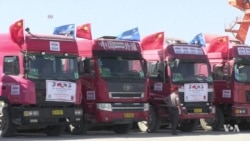ເມື່ອບໍ່ດົມມານີ້ ຈີນ ໄດ້ເປີດໂຄງການລິເລີ່ມເສດຖະກິດທົ່ວໂລກ ເປັນທີ່ຮູ້ຈັກກັນວ່າ ໜຶ່ງແລວທາງ, ໜຶ່ງເສັ້ນທາງ, ເຊິ່ງຖືກຕັ້ງຂຶ້ນຕາມຖະໜົນສາຍໄໝບູຮານ, ເປັນເສັ້ນທາງ ການຄ້າທີ່ເຊື່ອມຕໍ່ ຈີນ ກັບ ເຂດເອເຊຍກາງ ແລະ ພາກສ່ວນອື່ນໆຂອງໂລກ. ປະທານ
ປະເທດ ຈີນ ທ່ານ ສີ ຈິ່ນຜິງ ກ່າວວ່າ ນະໂຍບາຍໜຶ່ງແລວທາງໜຶ່ງເສັ້ນທາງແມ່ນໄດ້
ເພັ່ງເລັງໃສ່ການສົ່ງເສີມການຮ່ວມມືສາກົນ, ແຕ່ອະດີດເຈົ້າໜ້າທີ່ ສະຫະລັດ ແລະ ຜູ້ ບໍລິຫານທຸລະກິດບາງຄົນເປັນຫ່ວງວ່າ ຈີນ ບໍ່ໄດ້ເປີດປະຕູຂອງພວກເຂົາເຈົ້າດັ່ງທີ່ໄດ້
ອ້າງເອົາໄວ້ນັ້ນແທ້. ນັກຂ່າວວີໂອເອ Natalie Liu ມີລາຍງານເພີ່ມເຕີມຈາກນະຄອນ
ຫຼວງ ວໍຊິງຕັນ, ເຊິ່ງ ພຸດທະສອນ ຈະນຳລາຍລະອຽດມາສະເໜີທ່ານ.
ຈີນ ມີແຜນທີ່ຈະສ້າງທ່າເຮືອ, ທາງລົດໄຟ, ຖະໜົນຫົນທາງ ແລະ ໂຄງລ່າງພື້ນຖານ ອື່ນໆທົ່ວທະວີບ ເອເຊຍ, ອາຟຣິກາ ແລະ ຢູໂຣບ.
ທີ່ກອງປະຊຸມສຸດຍອດເມື່ອບໍ່ດົນມານີ້ ໃນນະຄອນຫຼວງ ປັກກິ່ງ, ປະທານປະເທດ ທ່ານ
ສີ ຈິ່ນຜິງ ໄດ້ອະທິບາຍໂຄງການທົ່ວໂລກນີ້ວ່າເປັນການ ສ້າງຜົນປະໂຫຍດໃຫ້ແກ່ບັນ ດາປະເທດ ແລະ ບໍລິສັດທີ່ເຂົ້າຮ່ວມໃນວຽກງານຂະໜາດໃຫຍ່ນີ້.
ແຕ່ກໍໄດ້ມີຄຳຖາມບາງຢ່າງຂຶ້ນມາ ກ່ຽວກັບ ເຈຕະນາທີ່ແທ້ຈິງຂອງ ຈີນ. ອະດີດຕົວ
ແທນການຄ້າ ສະຫະລັດ ທ່ານນາງ Charlene Barshevsky ກ່າວວ່າ: ຈີນ ໄດ້ຍຸຕິ
ຂະບວນ ການປະຕິຮູບເສດຖະກິດ ແລ້ວ ກັບມາເປີດຄືນໃໝ່. ແລະ ໃນທາງກົງກັນ
ຂ້າມ ມັນຈະເຮັດໃຫ້ມີການ ສູນເສຍຢ່າງຫຼວງຫຼາຍ, ມີການສະໜັບສະໜູນການຄ້າ
ຂາຍຢ່າງສູງ, ແລະ ມີການແບ່ງແຍກລະຫວ່າງ ສະຫະລັດ ກັບ ບັນດາບໍລິສັດຕ່າງ
ປະເທດ.”
ຍ້ອນສະພາບທຸລະກິດຂອງພວກເຂົາເຈົ້າໃນປັດຈຸບັນນີ້, ຈີນ ຈຶ່ງບໍ່ໄດ້ ຖືກພິຈາລະນາ ວ່າເປັນຈຸດໝາຍການລົງທຶນສູງສຸດ ສຳລັບບັນດາບໍລິສັດຕ່າງປະເທດ ທີ່ກຳລັງເພີ່ມ ຂຶ້ນຈຳນວນຫຼວງຫຼາຍ. ນີ້ແມ່ນການຄົ້ນພົບຂອງການສຳຫຼວດໂດຍສະພາການຄ້າ
ອາເມຣິກັນ ໃນ ຈີນ. ທ່ານ Willam Zarit ແມ່ນຫົວໜ້າຂອງກຸ່ມການຄ້າ.
ທ່ານ William Zarit ປະທານສະພາການຄ້າ ອາເມຣິກັນ ໃນ ຈີນ ກ່າວວ່າ “ບາງບໍລິ
ສັດກຳ ລັງຊອກຫາບ່ອນລົງທຶນແຫ່ງອື່ນໆໃນ ເອເຊຍ, ເອເຊຍຕາເວັນອອກສຽງໃຕ້,
ແລະ ບາງບໍລິສັດກໍໄດ້ມາຊອກບ່ອນຢູ່ໃນ ທະວີບ ອາເມຣິກາເໜືອ ໂດຍສະເພາະ
ບ່ອນ ທີ່ຄ່າໄຟຟ້າມີລາຄາຕໍ່າກວ່າຫຼາຍ, ແລະ ບາງເທື່ອ ແຮງງານກໍບໍ່ແມ່ນບັນຫາ
ໃຫຍ່ໃນການ ຜະລິດສິນຄ້າຂອງພວກເຂົາເຈົ້າ, ແລະ ກົດໝາຍ ແລະ ຄວາມໂປ່ງ
ໃສກໍແມ່ນເປົ້າໝາຍອັນດຽວກັນ.”
ບາງຄົນໄດ້ຊີ້ໃຫ້ເຫັນວ່າ ຈີນ ບໍ່ໄດ້ເພິ່ງພາເງິນທຶນ ແລະ ເທັກໂນໂລຈີ ຈາກຕ່າງປະເທດ ດັ່ງທີ່ພວກເຂົາເຈົ້າເຄີຍເປັນມາ, ແລະ ດັ່ງນັ້ນພວກເຂົາເຈົ້າ ຈຶ່ງບໍ່ມີຄວາມເປັນຫ່ວງ
ຫຼາຍປານໃດ ກ່ຽວກັບ ບໍລິສັດຕ່າງໆທີ່ຖອນຕົວອອກໄປ. ແຕ່ນັກວິເຄາະບາງຄົນກ່າວ
ວ່າ ການລົງທຶນທີ່ຕົກຕໍ່າລົງ ຍ້ອນນະໂຍບາຍທີ່ເຂັ້ມງວດຂອງ ປັກກິ່ງ ມັນຈຶ່ງອາດຈະ
ສົ່ງຜົນກະທົບໃຫ້ ຈີນ ຢູ່.
ທ່ານ Ted Moran ນັກເສດຖະເສດສາກົນຈາກສະຖາບັນ Peterson ກ່າວວ່າ “ຈີນ ໄດ້ມີໜ້າຢ່າງຫຼວງຫຼາຍໃນເວທີເສດຖະກິດໂລກຢູ່ແລ້ວ, ດັ່ງນັ້ນຂ້າພະເຈົ້າຈຶ່ງຈະບໍ່ ຄາດເດົາວ່າ ຈະມີໄພຮ້າຍແຮງ ໃດໆ, ຂ້າພະເຈົ້າພຽງແຕ່ຄິດວ່າ ມັນຈະມີການເຕີບ
ໂຕທີ່ຕໍ່າກວ່າ ແລະ ການເຕີບໂຕກໍຈະຕໍ່າຫຼາຍກວ່າອີກໃນທົດສະວັດຕໍ່ໄປ.”
ໃນຂະນະທີ່ປະທານປະເທດ ຈີນ ທ່ານ ສີ ໄດ້ເຜີຍແຜ່ຄວາມຄິດ ກ່ຽວກັບ ການກວມ ລວມໃນກອງປະຊຸມສຸດຍອດ ໜຶ່ງສາຍພານ, ໜຶ່ງເສັ້ນທາງນັ້ນ, ບັນດາບໍລິສັດບາງ
ແຫ່ງຂອງ ອາເມຣິກາ ຍັງຄົງ ມີຄວາມເປັນຫ່ວງຢູ່ວ່າ ມັນອາດຈະເປັນແບບຮູບຮ່າງທີ່
ມີຄວາມສຳຄັນ ຫຼາຍກວ່າເນື້ອຫາສາລະ.
((INTRO:))
[[China recently rolled out a global economic initiative known as the One belt, One Road,' named after the ancient Silk Road' - the trade route that connected China with Central Asia and other parts of the world.Chinese President Xi Jinping says the One Belt, One Road initiative is aimed at promoting international cooperation, but former U.S. officials and some business executives are concerned that China is not really keeping its doors as open as it claims.Natalie Liu has more from Washington.]]
((NARRATOR))
China's plan is to build ports, rail lines, roads and other kinds of infrastructure across Asia, Africa and Europe.
At a recent summit in Beijing, President Xi described the global initiative as a win-win for the countries and companies involved in the massive undertaking.
But some question China's true intentions.Former U.S. Trade Representative Charlene Barshevsky.
CHARLENE BARSHEFSKY, FORMER US TRADE REPRESENTATIVE))
((Mandatory cg: Wall Street Journal))
"China has stopped the process of economic reform and opening, and instead has put in place a spate of measures that are zero-sum, highly mercantilist, and discriminate against U.S. and foreign companies."
((NARRATOR))
Because of its current business climate, China is no longer considered a top investment destination for an increasing number of foreign companies.This was the finding of a recent survey by The American Chamber of Commerce in China.William Zarit is head of the trade group.
((WILIAM ZARIT, PRESIDENT, AMCHAM CHINA))
"Some companies are looking elsewhere in Asia, Southeast Asia, and some companies are looking back to North America where especially energy costs are much lower, and perhaps labor is not that great a factor in their manufacturing product, and rule of law and transparency are the name of the game."
((NARRATOR))
Some point out that China no longer depends on foreign capital and technology as it once did, and so is less concerned about companies pulling out.But some analysts say shrinking investment due to Beijing's heavy-handed policies might still cost China.
International economist Ted Moran of the Peterson Institute:
((TED MORAN, ECONOMIST,PETERSON INST. FOR INTERNATL. ECONOMICS))
"China is already such a huge presence on the world economic stage, so I'm not predicting any kind of disaster, I just think that there will be much slower growth and much less robust growth over the next decade."
((NARRATOR))
While Chinese President Xi touted the idea of inclusiveness at the One Belt, One Road summit, some American companies remain concerned that it may be more style than substance.





